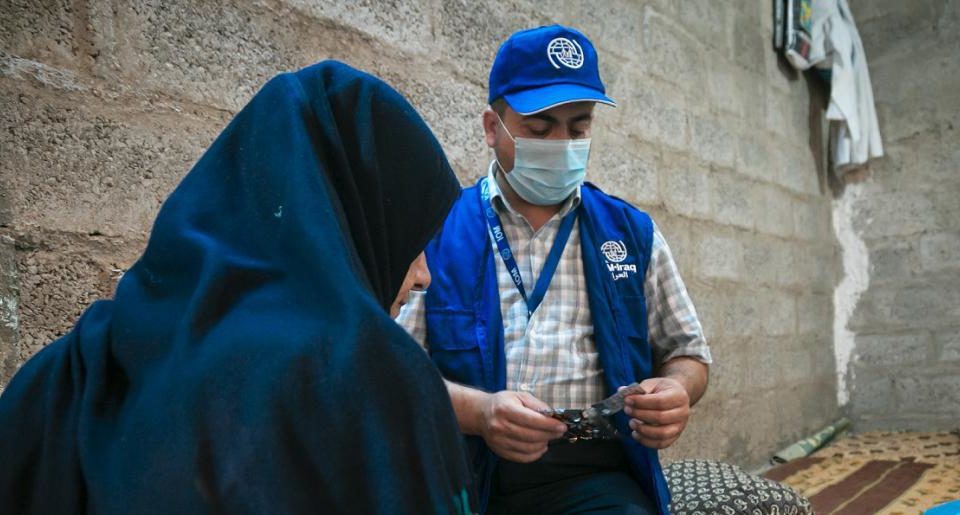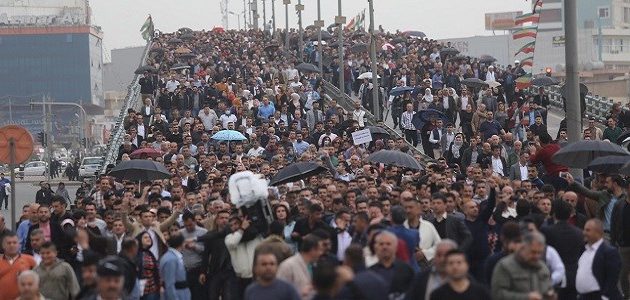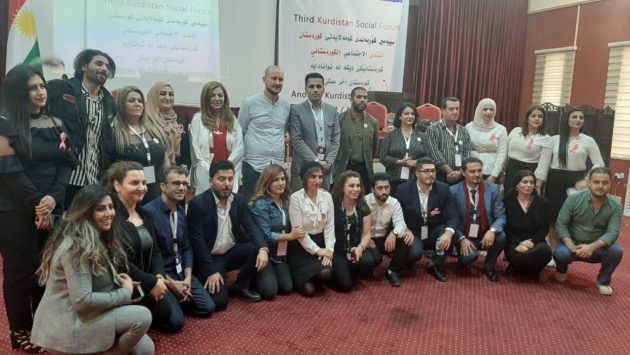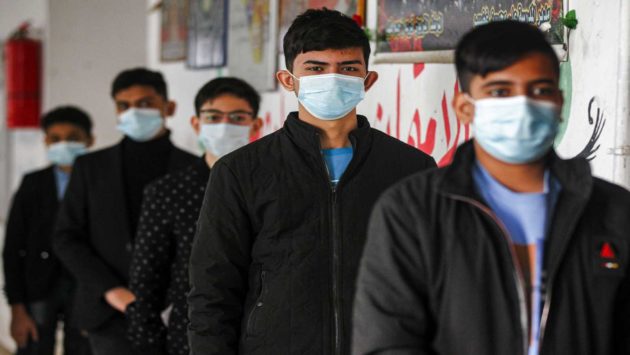Trade Unions and Workers’ Rights in the Time of COVID-19
On the occasion of May Day, or International Workers Day, when people around the world celebrate the accomplishments of the labor movement in organizing trade unions and winning just wages and improved working conditions for their members, workers from the Kurdistan Region of Iraq and Italy discussed trade unions and workers’ rights in their countries. The webinar that the Iraqi Civil Society Solidarity Initiative (ICSSI) organized, in collaboration with the Peace and Freedom Organization (PFO), Al-Mesalla Organization, and the Kurdistan Social Forum (KSF) in response to the Coronavirus pandemic, addressed the tremendous number of workers and employees who have lost their jobs, and the successes and failures of unions and governments to provide for workers’ protection and support in the face of the crisis.
Three union activists shared their experiences and reflections on the pandemic’s implications for workers:
- Abdulqadir Ahmed is a Board Member of the General Workers Union in the Kurdistan Region of Iraq.
- Silvana Cappuccio is a Senior Officer in the Department of International Politics of the Italian General Confederation of Workers (CGIL) and a Member of the Workers’ Group of the International Labour Organization (ILO).
- Soran Salah is the General Manager of Iraqi office of the Solidarity Center; he works with Iraqi trade unions and covers activities in the Kurdistan region.
Abdulqadir Ahmed began with some background on the activities of the General Union of Workers in the Kurdistan Region of Iraq (KRI). For many years, the union has focused on winning workers’ rights including adequate pay, safe working conditions, and social security benefits. It has worked over the years to establish an adequate minimum wage for all workers, not only its members. It also advocates for women’s rights: non-discrimination in hiring, equal pay, and an end to sexual harassment. The government in central Iraq passed a new, very strong labor law last year, Law 37, but the KRI follows the older labor law, which is not as strong, but still quite good. It requires the Ministry of Labor and Social affairs to work with the trade unions and civil society to identify and address the needs and problems that workers and employees are experiencing.
Now with the pandemic thousands have lost their jobs, which is creating a multitude of problems. We are trying to negotiate with the government to provide relief for the families of those who have no income. The Social Security Law provides some support for workers. We are also seeing a tremendous increase in domestic conflict and violence; this is a challenge that everyone needs to be concerned about and help to address. Many problems created by the spread of the Coronavirus remain to be solved.
Silvana Cappuccio began by reflecting that with more than 28,000 deaths in Italy, this was perhaps the saddest of May Days she has known. The pandemic has affected everyone in Italy and infections are still widespread. Certainly those most impacted are the healthcare workers and the food workers, those who are harvesting and selling the food we all need to live. In Italy, the impact of the pandemic varied greatly geographically. The north of Italy, which is the most industrialized region, was the hardest hit. Society has been in lockdown since the beginning of March. Most of the regulations were made in consultation with representatives of the affected workers. That was important, but it did not solve all the problems workers face.
The virus does not affect all workers the same. Some can work from home and they are relatively protected; they continue to receive pay. Those who cannot work from home, especially workers in the informal sector are more at risk and they are suffering great hardship. Big industries continued to work and the workers were paid; the unions negotiated for safety regulations. This was for private employers. The government also declared that no one could be fired because they became ill with COVID-19. But, the Italian economy is mainly comprised of very small enterprises. All of them have been closed through April. The government has not been able to offer sufficient relief for those had to close their businesses. They need more support to pay for their rent and utilities, and to make up for lost income.
The Italian General Confederation of Workers (CGIL) is the largest union in the country. Ms. Cappuccio explained how the CGIL worked with other unions and negotiated with the government concerning some of these difficult issues. The first major challenge was to define what were “essential services and businesses.” This was deeply concerning during the worst weeks of contagion. Workers were scared; they wanted everything to be closed. Employers insisted that businesses remain open and said if they were forced to close, they could not guarantee workers’ jobs. The unions refused to accept such blackmail. They went on strike. By early April there was agreement on what was “essential.” But now, after six weeks of closure, people’s needs are extreme. Italy is anticipating a slow reopening of businesses beginning on the 4th of May. The unions and the government have agreed this reopening requires that certain measures be observed. People must have personal protective equipment (PPE)—masks and gloves. Everyone must observe social distancing. People will have their temperature taken when they go to work. There is still much more planning that the unions need to do to insure that this reopening is as safe as possible for everyone.
Soran Salah began by explaining how the Solidarity Center works to advance workers’ rights and how its focus is shifting as a result of the pandemic. Previously the center worked on the ground with unions. In the past, May Day would have been an occasion for many public activities. But in the last weeks the center has adopted new strategies; it is emphasizing the use of information technology to communicate and to develop its plans jointly with all Iraqi workers. Earlier today the center gathered six unions from Iraq and the Kurdistan region, to discuss the current situation, and to insure that all Iraqi workers speak with one voice.
It is crucial to recognize, that Iraq does not just face workers’ problems because of the pandemic; the price of oil is plummeting worldwide. Iraq is going to face a severe budget crisis. So today, union members began by hearing from economists about their predictions concerning the future of the economy, what the impacts of falling oil prices and the pandemic will be, and how workers will be affected. Following the economists’ report, it was agreed to establish a joint team including includes trade union experts and academic experts that will specialize in economic issues; its working strategy will be reviewed at the next meeting. Secondly, it was agreed to establish a team focusing on the occupational safety precautions needed confront the virus on the job sites of workers in the electrical, water and sewage sectors because they must continue working; there are plans to train the team with the specialized knowledge they needed to provide for workers—what is the necessary PPE? What to do if they become infected? Mr. Salah emphasized that the Solidarity Center wants to foster dialogue between workers and the government. Life after the pandemic may be very different. We may need to change many of the ways we work. Dialogue is crucial to anticipate these changes and prepare. Equally important is to increase the communication and cooperation among all Iraqi unions and syndicates. It is important that they become familiar with information technology. All this is vital to prepare for the future.
Abdulqadir Ahmed next described how his union has tried to pressure the government and amplify the voice of workers. Their main activity has been to work through the Ministry of Work and Pensions to put pressure on business owners to continue to pay their workers during the quarantine. The union staff has itself been quarantined, but they have published statements on workers’ needs. Today they requested that the government apply Article 30 of the Iraqi Constitution in order to guarantee economic benefits to workers.
Iraqis must be realistic and recognize that the economy is dependent on oil, Mr. Ahmed stressed. All civil society and government will need to work together to find solutions. Moreover, in the KRI it is not only workers who face problems. The migrants, refugees and internally displaced persons (IDPs) have all been severely affected by COVID-19, the union also tries to advocate for them. The moderator asked if Mr. Ahmed had heard statements from an official at the Ministry of Labor and Social Affairs who said migrants in the KRI have no problems except the “illegals.” Mr. Ahmed said he had not, but in any case the union does not agree with statements like that, that migrants are illegal. “That is not our perspective; we do not discriminate—all are human!” he stated. There may be issues of proper documentation. The union hopes the government will protect all, equally. It has asked the government to ease the process for migrants to get help and be able to follow the practices that will keep them safe. For all workers’ rights advocates, Mr. Ahmed asked, let us agree humanity comes above all. The capitalist system may change after pandemic; whatever happens, everyone deserves a dignified life.
Workers Can Learn from the Experiences in Different Nations as Our Economies Reopen
Ms. Cappuccio reflected on some of the differences and similarities between Italy and Iraq: in Italy, since the beginning of the pandemic, we kept unions open so there was a space to welcome all the affected. Italy like Iraq has many migrants; with the lockdown they could neither go home or to work. Our union is supporting regularization of those who are undocumented, so that they can receive help.
What Italian unions can share is that Italy is entering its “second phase” of the pandemic—the reopening of businesses. As a result, the unions must address new issues. Foremost in Italy, Ms. Cappuccio said is supporting the role women play in the economy. They comprise the majority of healthcare workers, and supporting their ability to continue to work while assuring their safety and health on the job, it crucial. Many have children at home, because the schools are closed; for that they need additional support. Finally, some have experienced domestic violence, which has increased. In response, Italian unions are supporting the development of an app so women can seek assistance and protection. Any “exit strategy” or end to lockdown and quarantine must include protection for the occupational health and safety of workers and employees, as well as the larger pubic.
It is crucial that unions are strong and active during this new phase. But, freedom of association and our right to organize, which are both guaranteed in the Italian constitutional, have been curtailed. Conservative and xenophobic factions in the Italian parliament accused CGIL of holding the country hostage. It is important that trade unions everywhere support one another and our right to organize. The UN has affirmed workers’ rights to freedom of association and assembly. They issued ten key actions that governments must not take because of the pandemic. All union activists should be aware of this.
Mr. Salah agreed; these fundamental freedoms are essential. Unions will only be successful in if we have the numbers, large union membership. Then we can pressure the government to implement the laws, because we already have many good laws but they need to be implemented. And we can build a truly just society. That is a function of the right to organize. Workers can build international solidarity to protect this right. There are many opportunities for mutual support. Right now, the Solidarity Center is seeking recognition of COVID-19 as an occupational disease. We want states and international bodies to recognize that the right to health and safety on the job is fundamental. Together as an international trade union movement we should demand change. The priority should be the workers and not profit.
The Coming Economic Crisis and the Potential for Change
Prioritizing workers’ rights and needs over profits, the union activists agreed, will help us face the coming economic crisis differently from in 2008. The poorer nations should receive assistance without conditions. We must not increase problems in the poorer countries. We can rebuild economies by addressing the other major global crisis: climate change. We can create new “green jobs” for those who have lost their jobs. Tax systems must be reformed. States should reaffirm people’s universal right to an education.
Ms. Cappuccio emphasized that how we describe the challenges we face is important. Early on, the media in Italy said we were “at war” with the virus. Unions worked to change that language. Yes, the pandemic is serious and painful, but we can address it without violence. The emphasis belongs on how we improve infrastructure to benefit everyone. Unfortunately, in Italy there are xenophobic and fascist voices that are working to divide people.
Mr. Ahmed and Mr. Salah concluded by highlighting some of the rights and protections that unions in Iraq and the KRI still need to win. Despite strong labor laws, which conform to international standards, the laws are not always well implemented. Right now, 80% of workers are not guaranteed social security because there is no system of unemployment insurance as exists in the West. The unions could pressure the government to use the social security fund to pay those who are unemployed. Unions must also press harder for a system that ensures that those who retire continue to receive adequate incomes. All of this will require that the ministries that oversee workers’ and employees’ rights and needs are larger and stronger. This is crucial for the future of Iraq’s economy.
On the 1st of May (Labor Day), a group of activists, who support and advocate for worker’s rights and freedom of worker’s unions in Iraq publicly announced a platform, called the “Iraqi Observatory of Workers and Employees Rights.” In their official statement, the activists declared that due to the failure of the Iraqi government and political manipulation, workers are deprived of their basic rights and the workers’ unions are restricted from freely operating. The new platform will track and document violations committed against workers and their unions. It seeks to build support and provide a variety of services for workers to ensure they are able to enjoy their rights on the ground.




